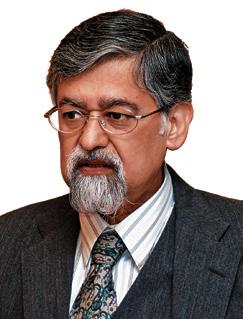
A few months ago, Suresh K (name changed on request) bought a one-way ticket to the US, joining the quiet exodus of young Indians chasing a future their homeland could not provide. At 27, with over two years of experience at a personal finance start-up in India, Suresh has already mapped out his trajectory: a master’s degree in AI from North Carolina State University, followed by—if all goes to plan—a career in the kind of frontier technologies that shape the modern world.
For Suresh, the decision was almost inevitable. The US has long been a gravitational force for the ambitious, a place where talent is rewarded. He has no illusions about returning home. “India would have to outbid America,” he says, matter-of-factly—not just in wages, but in the very architecture of career growth, in its ability to nurture research, innovation and technological ambition.
India’s intellectual capital is, arguably, its most valuable export. Yet why does it continue to be shipped abroad? Arvind Virmani, member of NITI Aayog and a former chief economic adviser (CEA), offers a blunt diagnosis: “Independent India never built its talent pyramid from the ground up. Instead, we started at the top, investing in elite institutions while neglecting primary and secondary education.” The result is a paradox—a country that produces world-class minds but struggles to retain them.
Leaving on a Jet Plane
By late 2024, Indian-origin executives led 25 of America’s 500 largest companies, more than doubling from just 11 in the early 2010s. The likes of Satya Nadella at Microsoft, Sundar Pichai at Google and Shantanu Narayen at Adobe have become symbols of Indian excellence. Their success is often framed as a point of pride for India, yet there is a deeper unease. These leaders built empires, not in Bengaluru or Hyderabad, but in Silicon Valley.
Denne historien er fra March 2025-utgaven av Outlook Business.
Start din 7-dagers gratis prøveperiode på Magzter GOLD for å få tilgang til tusenvis av utvalgte premiumhistorier og 9000+ magasiner og aviser.
Allerede abonnent ? Logg på
Denne historien er fra March 2025-utgaven av Outlook Business.
Start din 7-dagers gratis prøveperiode på Magzter GOLD for å få tilgang til tusenvis av utvalgte premiumhistorier og 9000+ magasiner og aviser.
Allerede abonnent? Logg på

HOW INDUSTRY LEADERS ARE SHAPING THE PATH TO 'VIKSIT BHARAT 2047'?
As India strives to achieve its ambitious goals under the Viksit Bharat 2047 initiatives, the vision and guidance of industry leaders are essential in navigating the path to economic growth, social progress, and sustainable development. Bringing you industry leaders who are playing a transformative role in shaping the path to Viksit Bharat by 2047.

ACHIEVING VIKSIT BHARAT 2047: ASM GROUP'S ROLE IN EDUCATIONAL TRANSFORMATION
India's vision of Viksit Bharat by 2047 aims to position the nation as a global powerhouse of knowledge, innovation, and economic prosperity.

UNITEDWORLD GROUP OF INSTITUTIONS: SHAPING YOUTH FOR FUTURE SUCCESS
Dr. Himanshu Sharma, the Founder-Director of Unitedworld Group of Institutions, stands as one of the most influential leaders in India's educational landscape. Under his leadership, Unitedworld Institute of Design (UID) has risen to the forefront of academic excellence, defining the future of education by integrating research, innovation, and experiential learning. His vision is simple yet profound: to shape India's youth in a way that enables them to thrive in a rapidly changing global world.

FROM MILITARY TO AN EDUCATOR: THE INSPIRING JOURNEY OF DR. CDR KARTIKAY SAINI
Dr. Cdr Kartikay Saini isn't just a leader; he's a catalyst for change, a visionary who transforms dreams into reality. With over three decades of diverse experience in the military, corporate world, and education, Dr. Saini has left an indelible mark on numerous fields.

How to Remove the Gender Gap
With an impressive tally of 1.59 lakh start-ups, India currently has the world's third-largest start-up ecosystem.

ATHARVA GROUP OF INSTITUTES: EMPOWERING INDIA'S FUTURE THROUGH TRANSFORMATIVE EDUCATION
In the vibrant landscape of Mumbai's educational ecosystem, Atharva Group founded in 1998 by Mr. Sunil Rane, a visionary educationist, stands as a 'perfect epitome' of transformative learning.

Electric Take-off
Automakers are sharpening their competitive edge to take each other on in a contest that will shape the electric car market in the country

AI as an Ally to Women at Work
When I embarked on my Microsoft journey 24 years ago, technology was already a game changer, bringing more women into the workforce and leadership roles, especially in India.

A Return to Stability
Union expenditure secretary Manoj Govil speaks to Parth Singh about the modest capex increase in this year's Budget and the role private players now must play. Edited excerpts:

Shop Floor Gets a Makeover
Growing automation and ESG guidelines are two reasons why more women are offered jobs in manufacturing that were earlier strictly male
